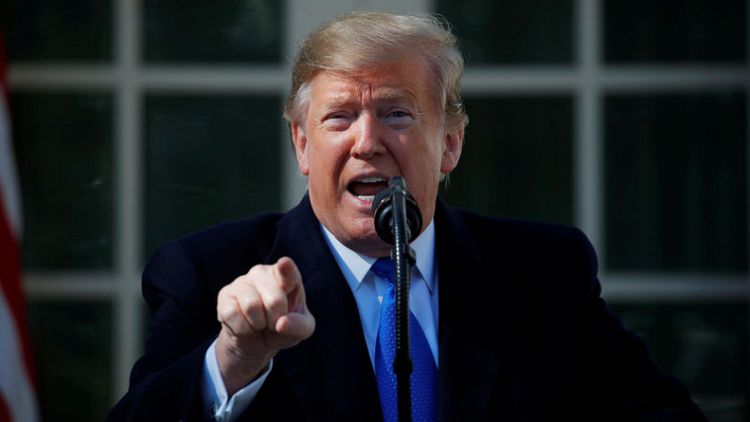By Roberta Rampton and Jeff Mason
WASHINGTON (Reuters) - U.S. President Donald Trump on Thursday threatened to impose tariffs on car imports from Mexico unless it does more to stop illegal migrants and drug trafficking, his latest warning to America's southern neighbour to tighten border security.
After backing away from a threat this week to immediately shut the border to stop a surge of migrants from Central America, Trump raised the spectre of a 25-percent tariff on cars as a possible tool he could use to force Mexico to halt illegal immigration and drugs.
"Before we close the border we'll put the tariffs on the cars. I don't think we'll ever have to close the border because the penalty of tariffs on cars coming into the United States from Mexico at 25 percent will be massive," Trump told reporters at the White House.
Earlier, Trump said he would give Mexico "a one-year warning" to stop drug trafficking, or face tariffs. But he held out the possibility that the measure could be used sooner to address migration issues.
Trump made stopping illegal immigration a centrepiece of his 2016 run for the White House, pledging to build a wall on the border to stop migrants. When Congress refused to give him the money to pay for the wall, he declared a national emergency to divert funds from other projects.
The Democratic-controlled House of Representatives will sue to block Trump from "stealing from appropriated funds," Speaker Nancy Pelosi said on Thursday.
Trump, who plans to visit the border at Calexico, California to view a border wall project, said that media coverage this week had prompted Mexico to act to curb the flow of immigrants to the United States and take other action to ease the pressure on U.S. ports of entry.
"A lot of good things are happening with Mexico. Mexico understands that we're going to close the border, or I'm going to tariff the cars," he said.
TRADE DISRUPTIONS
Trump prompted panic among business leaders last Friday with his border closing threat.
U.S. border officials have estimated that some 100,000 migrants were apprehended or encountered at the border in March, the highest level in a decade. Most are Central American families seeking asylum.
The Department of Homeland Security has transferred 750 border agents from commercial to immigration duties, triggering long delays for cross-border trade.
The U.S. Chamber of Commerce said it welcomed Trump's decision not to close the border, but said Congress needed to do more.
"Congress should also ensure Customs and Border Protection officials receive the resources they need to reduce the excessive wait times affecting legitimate trade and travel across the border," said Neil Bradley, a top official with the Chamber in a statement.
Mexican exporters are looking into sending their goods to the United States by air freight to avoid a five-mile (8-km)-long line of trucks at the border caused by the Trump administration moving federal agents away from customs checks to immigration duties.
Auto parts and medical equipment makers were among the Mexican companies considering the more expensive air cargo to avoid incurring penalties for late delivery to U.S. clients or factory closures, Luis Aguirre, the president of Mexico's manufacturing industry chamber INDEX, said late on Wednesday.
(Reporting by Roberta Rampton and Jeff Mason; Additional reporting by Doina Chiacu, Yeganeh Torbati and David Alexander in Washington and Lewis Krauskopf in New York; Editing by Howard Goller and Alistair Bell)


